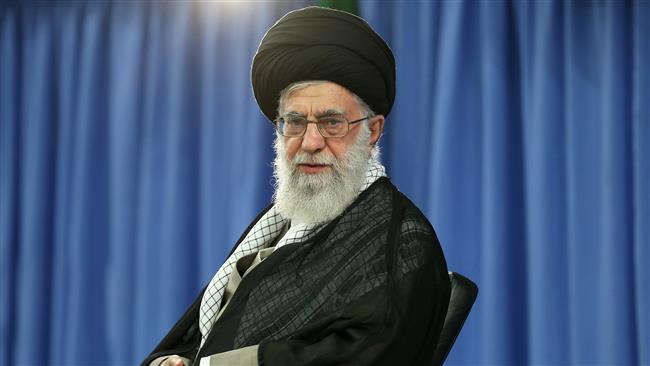PHOTO: Supreme Leader on Saturday: “We need to speed up scientific growth”
LATEST
Amid continued questions over Iran’s economic future and relations with the West, the Supreme Leader has again promoted his “Resistance Economy” for self-sufficiency.
Ayatollah Khamenei told academics on Saturday, “Resistance economy, if implemented in the real sense of the word, can cater for both national dignity and the requirements of the country because it relies on internal capacities.”
He continued:
The issue that I would like to emphasize is the pace of scientific growth. Today, we need to speed [it] up….
We have been kept behind at least 60-70 years by traitorous or ignorant governments. If we want to advance, we shouldn’t move forward with [only] the speed of those who are ahead [of us].
Tensions with Government
Khamenei introduced the concept of Resistance Economy in 2012 as the US and Europe tightened sanctions over Iran’s nuclear program. The Supreme Leader maintained that the Islamic Republic could maintain economic progress despite the restrictions.
However, Iran’s economy suffered from a combination of mismanagement, corruption, and the effects of the sanctions. Oil exports fell by up to 65% as inflation rose above 40% and production, investment, and the currency fell. In autumn 2013, the new President Hassan Rouhani convinced the Supreme Leader that a nuclear deal with the 5+1 Powers was essential to prevent economic collapse.
The July 2015 agreement and its implementation in January have raised the prospect of recovery, with oil exports rebounding and the Government pursuing multi-billion-dollar investment deals with European countries as well as long-standing partners like India and China.
However, Khamenei has checked Rouhani, rebuffing the President’s declaration that the “JCPOA” — the nuclear deal — will be followed by a “JCPOA 2” for prosperity. The Supreme Leader has rejected any links with a US which he claims is trying to undermine the Islamic Republic.
The situation has been further complicated by the persistence of some US sanctions and imposition of new ones over Iran’s ballistic missile tests. Despite reassurances by Secretary of State John Kerry that business can be renewed, many European companies are reluctant to confirm investment and trade with Tehran because of fear of US punishment.
President Rouhani continued to respond cautiously on Saturday, telling an audience of Iranian journalists of a recent discussion with the Supreme Leader: “During this meeting, Ayatollah Khamenei reiterated that one of the big achievements of the 11th government is creation of calmness in economy and society and this issue should not be harmed.”
More Oil Exports “Even at $20 A Barrel”
Oil Minister Bijan Namdar Zanganeh said on Saturday that economic recovery will be pursued with more oil output, even if global prices fell further.
Zanganeh said Tehran is resolved to regain its OPEC market share from 2011, before the US and European sanctions, even though “some are unhappy about Iran’s production increase and cite that as the reason for price reduction”.
He added, “Even if the oil price hits 20 dollars [per barrel], the plan for an output rise to the level of pre-sanctions periods will continue.”
Since the implementation of the nuclear deal, Iran has pursued a rapid increase in production, reaching more than 3.8 million barrels per day, according to Zanganeh. Exports have risen about 40%, from 1.4 million bpd to nearly 2 million.
Other OPEC members, such as Saudi Arabia, and Russia had hoped to implement a production freeze as prices fell from a high of about $120 per barrel in summer 2014 to less than $30 early this year. The price recover to more than $50 this month, but fall sharply last week to under $48.
Iran Official: Deal for 100 Boeing Jets Completed
The head of Iran’s civil aviation says an agreement has been concluded with the US aerospace company Boeing, for the purchase of 100 passenger jets,
Ali Abedzadeh said the deal now awaits US government approval.
Abedzadeh said that, of 250 planes in Iran’s passenger fleet, 230 need to be replaced.
Boeing confirmed on Wednesday that it was in talks with Iranian airlines interested in buying the jets. It was granted permission from the US Government in February to explore resumption of sales after the lifting of sanctions.
In January, Iran signed a $27 billion deal with Airbus for 118 planes. The agreement still awaits permission from the US Treasury, because more than 10% of Airbus components are of American origin.

